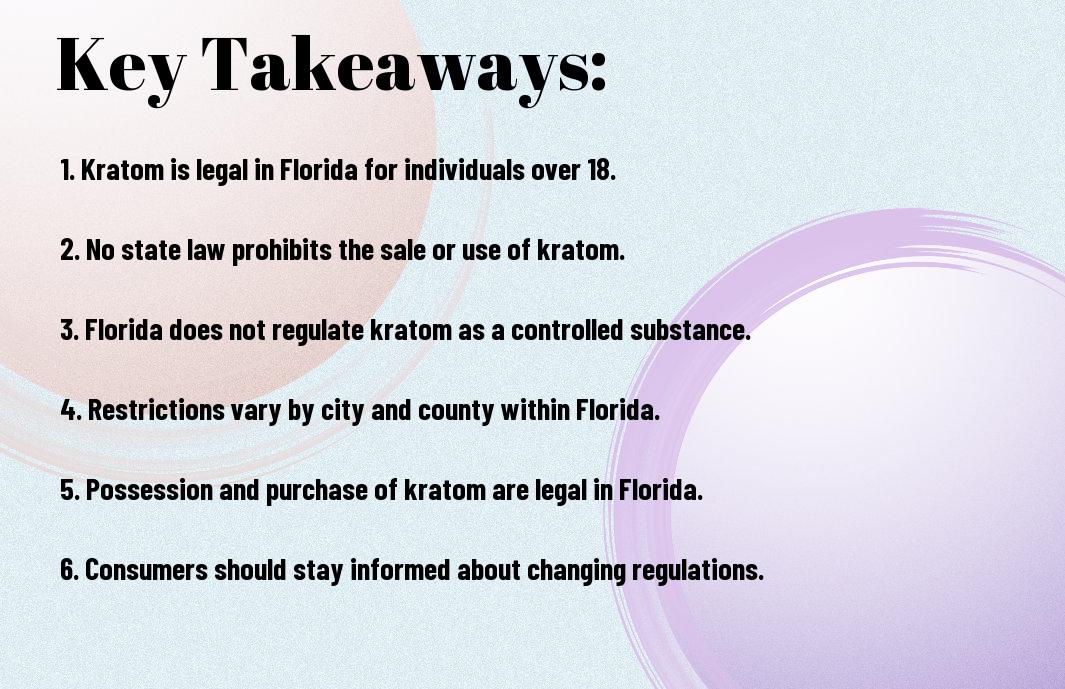You might be wondering, amidst the sea of confusing laws and regulations, whether the mystical herb kratom is indeed legal in the vibrant state of Florida. Let’s explore the murky depths of legislation and emerge with clear and factual answers about the status of kratom, a substance causing quite a stir in various circles. Buckle up, as we navigate the wild world of Florida’s legal landscape when it comes to this controversial plant.
Key Takeaways:
- Kratom is legal in Florida: As of now, kratom remains legal to buy and use in Florida, with no pending legislation to ban it.
- Regulations may change: While kratom is currently legal, the legal status of kratom can fluctuate, so it’s necessary to stay informed about any potential changes in regulations.
- Buy from reputable sources: To ensure quality and safety when purchasing kratom in Florida, it’s crucial to buy from reputable vendors who follow regulations and provide accurate labeling.

History of Kratom
Origins and Traditional Use
Kratom is a tropical evergreen tree native to Southeast Asia, belonging to the coffee family. Its leaves have been used for centuries by indigenous communities in regions like Thailand, Indonesia, and Malaysia. In traditional practices, kratom was consumed by chewing its leaves or brewing them into teas for their stimulating and analgesic effects.
Modern Popularity and Controversy
The modern rise in popularity of kratom can be attributed to its purported pain relief and mood-enhancing properties. However, with increased usage, controversies have arisen, with critics raising concerns about its addictive potential and potential for abuse. In the United States, kratom is legal on a federal level, but some states have banned its sale and use due to these safety concerns.
The controversy surrounding kratom stems from its similarity to opioids in terms of effects, leading to fears of addiction and misuse. While advocates tout its natural origins and potential benefits, regulatory bodies are cautious about its unverified claims and safety profile. As the debate continues, the legality of kratom in various states remains a hot topic.

Legal Status of Kratom in the US
It is crucial to understand the legal landscape surrounding kratom in the United States to navigate its usage effectively. The legality of kratom is a complex issue that varies at both the federal and state levels.
Federal Laws and Regulations
Legal restrictions on kratom at the federal level are constantly evolving. While the DEA has previously attempted to classify kratom as a Schedule I controlled substance, facing backlash from advocates and lawmakers, as of now, kratom is legal at the federal level. However, the FDA has issued warnings about potential risks associated with its consumption.
State-by-State Legal Landscape
The legality of kratom at the state level is a patchwork of different regulations. Some states have banned kratom outright, labeling it as a dangerous substance with no medical value. Conversely, other states have chosen to regulate kratom or have pending legislation on its legal status. It is important for individuals to research and understand the specific laws in their state regarding kratom.
State-by-State knowledge is crucial for individuals intending to use kratom, as violating kratom laws can lead to severe consequences. It is advisable to stay informed about any changes in kratom regulations and to adhere to the laws in your state to avoid legal issues.
Kratom in Florida
For Is Kratom Legal in Florida? Full Facts, let’s explore into the status and legal history of kratom in the Sunshine State.
Legal History and Current Status
Status – The legal status of kratom in Florida is relatively murky. While kratom is legal at the state level, some local jurisdictions have implemented restrictions or bans on its sale and use. For consumers, it’s imperative to stay informed about the local laws and regulations regarding kratom.
Efforts to Ban or Restrict Kratom
Kratom – Despite efforts to ban or restrict kratom in Florida, advocates have successfully pushed back against these measures. While there have been attempts to classify kratom as a controlled substance, so far, these efforts have not been successful.
Plus, the continued fight to keep kratom legal in Florida highlights the importance of advocacy and education within the kratom community. By staying informed and actively participating in the legislative process, supporters of kratom can help ensure continued access to this natural supplement.
Florida Laws and Regulations
Statutes and Codes Governing Kratom
After scrutinizing Florida’s legal landscape, it’s evident that kratom falls into a grey area within the state’s statutes. While kratom itself is not specifically listed as a controlled substance in Florida’s controlled substance schedules, the state has made moves to ban certain alkaloids present in kratom. This ambiguity has led to confusion regarding kratom’s legality in the Sunshine State.
Enforcement and Penalties
Governing the enforcement of kratom laws in Florida can be a murky affair. With no clear-cut legislation regulating the sale or possession of kratom, enforcement can vary across different jurisdictions within the state. However, individuals caught with kratom that contains banned alkaloids could potentially face legal consequences, including fines or even imprisonment.
On the enforcement front, the lack of specific laws regarding kratom in Florida can create a risky scenario for users and sellers alike. The volatility in enforcement actions can make it challenging to navigate the legal landscape and understand the potential penalties for dealing with kratom.
For instance, despite the ambiguous legal status of kratom in Florida, it’s crucial for individuals to stay informed and exercise caution when using or distributing kratom products within the state. Understanding the nuances of the law and potential repercussions can help users make informed decisions and avoid legal entanglements.
Advocacy and Opposition
Pro-Kratom Groups and Lobbying Efforts
Not everyone is against kratom. Pro-kratom groups advocate for the beneficial properties of kratom and strive to ensure its legality in Florida and other states. They argue that kratom can be used responsibly and has helped many individuals manage chronic pain, anxiety, and other health issues without the need for traditional pharmaceuticals.
An example of a pro-kratom lobbying effort is the American Kratom Association (AKA), which works to educate lawmakers and the public about kratom’s benefits and to push for regulations that keep kratom legal and accessible.
Anti-Kratom Campaigns and Concerns
AntiKratom groups and individuals campaign against the use of kratom due to concerns about its potential for abuse, addiction, and adverse effects. They argue that kratom has not been thoroughly researched and may pose risks to public health and safety.
With reports of negative side effects and even deaths linked to kratom use, opponents of the plant have called for stricter regulations or an outright ban on its sale and consumption in Florida and other states.
Public Health and Safety
Now, let’s probe the public health and safety aspects of kratom in Florida.
Reported Adverse Effects and Risks
Any substance that interacts with the body’s chemistry can potentially have adverse effects, and kratom is no exception. Some reported adverse effects of kratom include nausea, itching, dry mouth, constipation, increased urination, and in higher doses or with prolonged use, potential for addiction and withdrawal symptoms. It’s important to note that kratom is not regulated by the FDA, so the purity and dosage of kratom products can vary widely, leading to unpredictable outcomes.
Potential Benefits and Therapeutic Uses
To some users, kratom offers potential benefits and therapeutic uses. Some believe that kratom can relieve pain, increase energy, improve mood, and even aid in managing opioid withdrawal symptoms. However, more research is needed to confirm these effects and to understand the long-term consequences of kratom use.
Risks associated with kratom use include the potential for dependency, addiction, and overdose. It’s crucial for individuals considering kratom as a therapeutic option to be aware of these risks and to approach its use with caution and moderation. Consulting with a healthcare professional before incorporating kratom into a wellness routine is advisable to ensure safety and efficacy.
Summing up
Drawing together the information provided, kratom remains legal in Florida as of the time of this article. It is important to stay informed about any changes in legislation that might affect the legality of kratom in the state. As always, it is advisable to consume kratom responsibly and be aware of any regulations that may apply.
FAQ
Q: Is Kratom Legal in Florida?
A: As of 2021, kratom is legal in the state of Florida for individuals over the age of 18. However, certain counties and cities in Florida have banned the sale and possession of kratom, so it’s crucial to check local regulations.
Q: What is Kratom?
A: Kratom is a tropical tree native to Southeast Asia, known for its leaves that contain psychoactive compounds. It is commonly used for its stimulant effects and as an alternative to traditional opioids for pain relief.
Q: Can I Buy Kratom in Florida?
A: Yes, you can legally purchase kratom in Florida from various online and physical stores. It’s crucial to ensure that you are buying from a reputable source to get high-quality and safe products.
Q: Are There Any Restrictions on Kratom in Florida?
A: While kratom is legal in Florida, there are age restrictions in place. Individuals under the age of 18 are not allowed to purchase or possess kratom in the state.
Q: Is Kratom Safe to Use?
A: The safety of kratom is a subject of ongoing debate. While some people use it successfully for pain management and other purposes, there are risks of dependency and adverse effects. It’s crucial to use kratom responsibly and consult with a healthcare professional before trying it.










